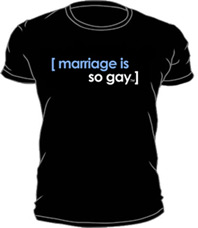 |
| Source |
Since Dollywood is a privately owned place, it's really within their rights to allow (or not) any article of clothing they want. It's not much different than a club having a no-jeans policy, or a store refusing service to someone not wearing shoes.
But those policies usually have a reason behind them. The park spokesman said Dollywood requires clothing or tattoos that could offend others to be covered. Shouldn't that policy be better written? A t-shirt supporting the Boston Red Sox could be potentially offensive to New York Yankee fans in the park - so would a Red Sox fan be forced to remove his t-shirt?
That's extreme, of course, but the point is that any message or idea has the potential to offend someone. An arbitrary policy like this just seems too open to interpretation to be really effective. Presumably Dollywood is an equal opportunity employer that doesn't discriminate against sexual orientation. So if the park employee taking tickets that day had been a gay man or woman, would the t-shirt have been thought potentially offensive? Probably not.
Years ago, I was in Disney with X. He chose a particularly graphic t-shirt to wear when we visited MGM Studios. It was blatantly offensive - but he was admitted to the park. Later on, he was asked to reverse the shirt because others had complained. He didn't mind - he actually felt bad because he wasn't even thinking about the message on the shirt when he got dressed that morning (frankly, neither was I). It didn't offend either one of us, but it did others, and since they paid for the same tickets, and were upset enough to complain, it had to be addressed.
Doesn't a policy that says you may be asked to cover clothing or tattoos if other patrons are offended make sense? If the point is to "protect" others, shouldn't they be the ones to decide what they do, and do not, find offensive? Otherwise, isn't it really just an arbitrary rule that allows the personal preferences of park employees to be enforced?
I think they should be able to make a judgement call about what will offend and what won't offend. Obviously the t-shirt above is on the line but, IMHO, it crosses it. The joke is the use of the word gay as a synonym for the word 'uncool'. I think that this is offensive to gay people and I can understand a company fearing that a gay customer might be upset by it. Especially a gay customer with no sense of humor.
ReplyDeleteThey do have a right, as a private organization, to police the activities within their park. However, as a public accommodation, they cannot discriminate against federally protected classes. However, sexual orientation is not a federally protected class, so they would not be eligible for such protection. Beyond that, as it is their park, it SHOULD BE the personal preferences of the park employees (or park policy) that rules. Therefore, they are within their rights to block the t-shirt.
"Since Dollywood is a privately owned place, it's within their rights..." - so, I agree they have the right to their policy. I just don't think it's well thought out.
ReplyDeleteThe action of the park employee put the park in national focus, and forced its owners to basically take a stance on a politically and socially charged issue. If I owned a business, I would not want those decisions or actions made by a part-time employee making $8/hour.
The shirt is a pro-SSM message. It was being worn by a woman visiting the park with her partner and their children. It doesn't sound like Dollywood was afraid to offend homosexual patrons. Sounds more like they were worried heterosexual patrons would be offended.
Either way, if explaining what they did or did not mean is how Dollywood wants to spend its money - rock on. I'm just saying I wouldn't choose to do it that way. I'd let my customers decide. Who knows - maybe no one would've been bothered by the shirt. Then all of this was for nothing. Waste.